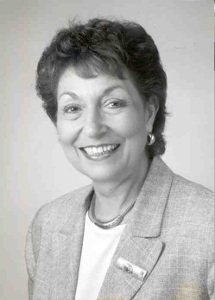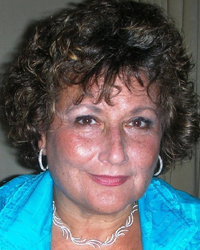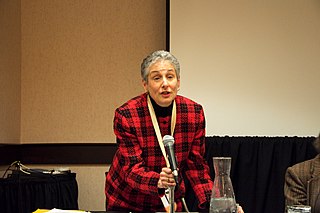Related Research Articles
The American Library Association (ALA) is a nonprofit organization based in the United States that promotes libraries and library education internationally. It is the oldest and largest library association in the world.

Judith Fingeret Krug was an American librarian, freedom of speech proponent, and critic of censorship. Krug became director of the Office for Intellectual Freedom at the American Library Association in 1967. In 1969, she joined the Freedom to Read Foundation as its executive director. Krug co-founded Banned Books Week in 1982.

Zoia Markovna Horn was an American librarian who in 1972 became the first United States librarian to be jailed for refusing to share information as a matter of conscience. Horn, an outspoken member of the American Library Association's Intellectual Freedom Committee, worked at Bucknell University in Lewisburg, Pennsylvania, in the early 1970s. Horn was jailed for nearly three weeks for contempt of court after refusing to testify for the prosecution in the 1972 conspiracy trial of the "Harrisburg Seven" anti-war activists.

Alexander Peter Allain was an American lawyer and library advocate known for his work securing the freedom of expression. His career was devoted to securing First Amendment rights for libraries.

William Shepherd Dix was a scholar and librarian who had a 22-year career as Librarian at Princeton University in New Jersey, without a degree in library science. His contributions to the field of librarianship, however, are varied and notable, making him worthy of recognition in the American Libraries' 100 most important figures.

Clara Stanton Jones was the first African-American president of the American Library Association, serving as its acting president from April 11 to July 22 in 1976 and then its president from July 22, 1976, to 1977. Also, in 1970 she became the first African American and the first woman to serve as director of a major library system in America, as director of the Detroit Public Library.

Carla Diane Hayden is an American librarian who is serving as the 14th librarian of Congress. Since the creation of the office of the librarian of Congress in 1802, Hayden is both the first African American and the first woman to hold this post. Appointed in 2016, she is the first professional librarian to hold the post since 1974.

Emerson Greenaway was an American librarian of considerable note, particularly during the Cold War era of the 1950s. During his long career, he acted as the director of the Enoch Pratt Free Library of Baltimore, the director of the Free Library of Philadelphia and president of the American Library Association. He was also a highly respected scholar and an advocate for intellectual freedom in wartime. Greenaway also came under fire for his participation in anti-communist government committees. In 1999, American Libraries named Greenaway as one of the one hundred most important library figures of the 20th century.
Intellectual freedom encompasses the freedom to hold, receive and disseminate ideas without restriction. Viewed as an integral component of a democratic society, intellectual freedom protects an individual's right to access, explore, consider, and express ideas and information as the basis for a self-governing, well-informed citizenry. Intellectual freedom comprises the bedrock for freedoms of expression, speech, and the press and relates to freedoms of information and the right to privacy.
Librarianship and human rights in the U.S. are linked by the philosophy and practice of library and information professionals supporting the rights enumerated in the Universal Declaration of Human Rights (UDHR), particularly the established rights to information, knowledge and free expression.

Dr. Vicki L. Gregory is professor emeritus at the School of Information at the University of South Florida (USF). She and was director of the School from 1999 until 2007. Her fields of specialization include: academic libraries, digital librarianship, technical services, information science, library networking, library automation, and collection development. Prior to teaching at USF Dr. Gregory was Director of Systems and Operations for the Auburn University at Montgomery Library. She is currently President of Beta Phi Mu. She was Treasurer for the Association for Information Science and Technology (ASIS&T) and the winner of the 2014 Watson Davis Award. She is also the author, co-author, or editor of seven books and has published numerous articles.

Patricia Glass Schuman is an American librarian and publisher who served as president of the American Library Association from 1991 to 1992. She is a graduate of the University of Cincinnati and the Columbia University School of Library Service.

Loida Garcia-Febo is a Puerto Rican American librarian and library consultant. Garcia-Febo served on the Governing Board of the International Federation of Library Associations (IFLA) 2013-2015 and 2015-2017 and she was a member of the executive board of the American Library Association 2015-2020 serving as a board member and president. She was president of the National Association to Promote Library and Information Services to Latinos and the Spanish Speaking (REFORMA) from 2009 to 2010.

Nancy C. Kranich is an American librarian. She served as president of the American Library Association from 2000 to 2001. During her term as the American Library Association's president, she focused on libraries' role in building democracies.

Barbara Stripling is an American librarian and is the President of the Freedom to Read Foundation, a non-profit legal and educational organization affiliated with the American Library Association. Stripling served as president of the American Library Association from 2013 to 2014. During her term as president, she stressed that "Libraries Change Lives."

Julius C. Jefferson Jr. is an American librarian who was president of the American Library Association for the 2020-2021 term. In 2022 President Joe Biden appointed him to the National Museum and Library Services Board which advises the agency on general policies with respect to the duties, powers, and authority of the Institute of Museum and Library Services relating to museum, library, and information services, as well as the annual selection of the recipients of the National Medal for Museum and Library Service. Jefferson is additionally a section head of the Congressional Research Service at the Library of Congress, and served as the president of the Freedom to Read Foundation from 2013 to 2016.

Patricia "Patty" Wong is the city librarian of Santa Clara, California. Wong was the president of the American Library Association (ALA) for the 2021–2022 term and is the first Asian American president of the ALA. She has been on the faculty at the San Jose State University iSchool since 2006, teaching subjects such as equitable access to library services, library management, and library services to young people.

Lucille Cole Thomas was an American librarian. Thomas had a long career supporting library services for children with the New York City Board of Education. She was the first African American president of the New York Library Association. She also served as president of the International Association of School Librarianship and the American Association of School Librarians.
Nicole Amy Cooke is an African-American librarian and the Augusta Baker Endowed Chair at the University of South Carolina. Her research focus on critical cultural information studies in libraries and her advocacy for social justice have earned recognition in the library profession.
References
- 1 2 "Ann Symons to Receive Downs Intellectual Freedom Award - American Libraries Magazine". Archived from the original on 2017-08-24. Retrieved 2017-08-24.
- 1 2 3 4 "ALA names Honorary Member". www.ala.org. 22 February 2017.
- 1 2 "Symons, Ann K. - The American Library Association Archives". archives.library.illinois.edu.
- ↑ "The American Library Association honors Ann K. Symons with 2014 Equality Award". www.ala.org. April 2014.